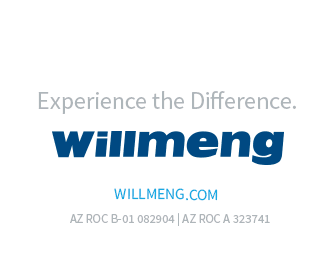The Meier & Frank Building: A New Life for an Old Department Store

An adaptive reuse project revitalizes an iconic retail tower in Portland, Oregon.
For residents of a certain age in Portland, Oregon, the phrase “meet me under the clock” meant the clock on the main floor of the Meier & Frank department store, which first opened nearly 150 years ago. The 16-story terracotta landmark building at 555 Southwest Morrison Street encompasses an entire city block near Pioneer Courthouse Square, widely known as “Portland’s living room.”
In November 2016, a new era for the Meier & Frank Building began when KBS purchased the asset for $54 million in a joint venture with private development firm Sterling Bay with the intent of repositioning the property. Converting part of a beloved former department store into a fully leased Class A mixed-use space while preserving the historical integrity of the original property required hard work as well as some creative problem-solving.
The History
In 1857 German immigrant Aaron Meier founded a dry goods store in downtown Portland; by 1873, employee Emil Frank joined as partner. Meier and Frank were pioneers in experiential shopping. The “Friday Surprise” started in April 1887 as a weekly sales event that drew crowds from across Portland for decades and generated record sales. The store was the site for memorable Christmastime events for generations of Oregonians. The company expanded through the years, adding locations in Oregon, Washington state and Utah.

The Meier & Frank Building in downtown Portland, Oregon, won Best in Category and Jurors Choice awards in 2019 from the Oregon chapter of the International Interior Design Association (IIDA). Courtesy of KBS
Architect A.E. Doyle designed part of the current building, which was completed in 1909, with major expansions occurring in 1915 and 1932. It was added to the National Register of Historic Places in 1982 as an outstanding example of the Commercial Style in architecture. It was also the largest retail outlet west of the Mississippi during the 1930s.
In 1966, Meier & Frank was sold to the May Department Store chain, and in 2006 the store was converted into a Macy’s department store. It closed in May 2017, making way for the historic renovation ahead.
KBS chose Bora Architects in 2016 to convert the first five floors and basement levels into flexible creative office and retail space. The Bora team included interior designer Sarah Weber, project architect Josh Brandt and project manager Leslie Cliffe, along with contractors who restored the façade to its original terracotta exterior, allowing passersby and tenants alike to enjoy the beauty of the restoration. The $16.6 million project, which took a year to complete, included 200,000 square feet of core renovations and 23,000 square feet of interior renovations.

Longtime Portland residents remember the phrase “meet me under the clock,” which referred to the clock on the main floor of the Meier & Frank department store. The renovated mixed-use building has preserved the community landmark in the lobby. Courtesy of KBS
The luxury hotel The Nines occupies the top nine floors, offering tenants access to two restaurants and an expansive rooftop bar and lounge. The name “The Nines” is an homage to Meier & Frank’s reputation as a destination for “dressed to the nines” fashion shopping.
Recognizing the Potential
KBS recognized many valuable reasons to reposition this historic building.
First, Portland offers a lower cost of living than other major West Coast cities and has drawn a steady stream of millennial residents, many of whom are employed in the tech industry. Portland’s tech-talent labor pool is the 26th largest nationally at 60,550 workers, comprising 5% of the city’s overall workforce. (The national average is 3.7%.) This talent pool attracts top companies, many of which are seeking to expand in the months ahead to accommodate social distancing as Americans return to the office in a post-COVID world.
Secondly, numerous investment-grade tenants have signed long-term leases in downtown during recent years, including Nike and Intel. Intel is the largest private employer in Oregon, and its Portland office employs more people than its Silicon Valley headquarters.

Upgrades to the Meier & Frank Building’s common areas include building out multiuse gathering spaces and lounges for tenants, and adding exposed concrete ceilings and brass finishes. Courtesy of KBS
Finally, the Meier & Frank Building’s proximity to numerous walkable amenities, including all four of the city’s rail lines, supports the live/work/play lifestyle demanded by today’s office tenants. Within a mile are hundreds of restaurants, cafes, local and national retailers, and breweries. The Pine Street Market, a popular food hall with gourmet vendors, is also nearby.
The Renovation
The renovations to the property integrated numerous enhancements and functionality while appealing to tenants and the local community. Upgrades included exposing the terracotta stone tile and removing the awnings to restore the building’s exterior to its original state, then transforming the interior into a modern creative mixed-use space.
In addition, the team converted one of the building’s basement levels into a 15,000-square-foot amenity floor that offers tenants complimentary access to a professionally operated spin/yoga/meditation room, a full fitness room with available personal training, showers, a bike-storage facility equipped with 200 bike-parking spaces, lockers and drying closets (ventilated compartments designed to dry clothing throughout the day, a welcome amenity given Portland’s frequent rainy weather).
The bike amenities are especially popular as many employees in the Meier & Frank Building take advantage of its centralized location by cycling to work.
KBS also completed upgrades on the property’s common areas, including building out multiuse gathering spaces and lounges for tenants, adding exposed concrete ceilings and brass finishes, restoring the lobby’s iconic clock, and revealing the original elevator’s marble stone, which had been covered up during a previous renovation. These upgrades highlight Portland’s historic charm and reinforce the community’s ties to the building.
As Portland is known for having an established coffee culture, it was important to include a lobby-level coffee bar for tenants and the community.
Navigating the Demands of a Historic Renovation
The Meier & Frank renovation presented several challenges for the redevelopment team.
As the building is a local and national historic landmark, they worked closely with the State Historic Preservation Office (SHPO) and the City of Portland Design Commission (CPDC). The team also collaborated with historic consultant Peter Meijer, who regularly works throughout Oregon on SHPO compliance issues. Meijer advised on exterior changes and helped to develop an interior renovation standard that was pre-approved by SHPO. This strategy enables tenants to implement improvements without having to seek an additional SHPO review and approval, saving time and cost.

Oversized floor plates, high ceilings and flexible work spaces are among the signature design elements in the Meier & Frank Building. Courtesy of KBS
The redevelopment team also worked to gain buy-in from the local community, who were reassured that the property would retain its historical integrity after the renovations were finished.
Another challenge was the preservation of the property’s historic tax credit. The project had an existing historic credit/special assessment that had carried over from its original renovation. The redevelopment team was careful to maintain compliance with the terms of that special assessment in order to preserve the credit and avoid triggering retroactive taxation.
Additional compliance covered regulatory issues surrounding the exterior improvements to the building, which are governed by the city of Portland and subject to review by the Historic Landmarks Commission. The team was thoughtful in crafting a strategy that would deliver the necessary upgrades while staying true to the rich history of the property. Ultimately, exterior improvements included removing canopies and reopening several historic entries that had been closed off for 50 years.
Opening the space required moving building systems that were on the perimeter of the floorplate. The chief concern was ensuring that the leasable areas were flexible enough to appeal to a wide range of tenant types, from traditional office users to modern high-tech companies.
Another requirement was keeping the Meier & Frank entrance on the southwest corner of Pioneer Square. After the renovations, the entryway would be 54 inches above the lobby floor. To bridge the gap, the team installed a ramp between the initial entryway and the property entrance, which added to the building’s ambiance.
The size of the building required a combination of high-tech and low-tech construction processes. While Bora Architects was familiar with building information modeling (BIM) software and Revit as a documentation tool, these systems were not comprehensive enough to deal with the realities of a 109-year-old building. During meetings with Turner Construction and the mechanical consultant, Bora manually drew the planned locations of duct work and conduit routings on the floor, and the team walked the paths to determine the proper course of action.

The city of Portland is known for its coffee culture, so the Meier & Frank redevelopment team made sure to include a coffee bar in the lobby for tenants and the community. Courtesy of KBS
Perhaps the most innovative solution arose from one of the team’s mechanical partners. Typical offices, which are filled with employees and heat-generating computers, demand air-cooling systems that are larger than those required by retail spaces. Accessing the roof during construction was necessary in order to replace a smaller cooling system with a larger one — an obstacle the team needed to accomplish without tearing through the nine-story hotel above the space that was being renovated. PAE Engineers installed a high-efficiency evaporative fan from an existing cooling tower on the roof that pipes cold water down to the office floors. This impressive solution worked around the constraints unique to the building while maintaining the positive relationship between the redevelopment team and The Nines Hotel.
The hotel was also fully operational during the project, so another challenge involved reducing vibrations and loud noises during construction. To address this, Bora Architects scheduled louder activities for later in the day, set a curfew for work and shut down construction when needed. It also scheduled deliveries during times that wouldn’t impede the flow of traffic into the hotel.
The Surprises
As interior space is demolished when renovating a historic property, surprises are nearly always revealed, and Meier & Frank was no exception. Fortunately, all of the building’s surprises were positive.
The building had been expanded in three phases in 1909, 1915 and 1932. The strategy was to leave the ceiling exposed because the processes for pouring concrete during each of those eras required different technologies. As it happens, exposed ceilings are currently a popular trend in the office sector, so this design element was an unexpected win for the redevelopment team.
Other surprises emerged when removing finishes revealed beautiful details, such as the original terrazzo floor in the lower level — over which carpet had been installed — that simply required patching to repair it.

Renovating this building meant embracing its history while peeling back the layers to reach the impressive design elements. The team wanted to celebrate and honor the previous design, and in doing so, it uncovered the property’s beauty and sense of place.
The Results
The restorations KBS has implemented at Meier & Frank pay homage to the property’s historic roots and classic architecture while providing state-of-the-art tenant space. This combination differentiates the property in the Downtown Portland market.
While the downtown office market faced significant challenges in 2020 due to social unrest and COVID-19, this building’s amalgam of ideal location, rich history and leading-edge amenities has resulted in continued significant interest from a broad spectrum of tenants.
The project received the LEED Silver (Core + Shell) designation when finished. It also received accolades from the design community, winning Best in Category and Jurors Choice awards in 2019 from the Oregon chapter of the International Interior Design Association (IIDA).
In addition, the recent renovations serve to enhance the property’s suitability for office tenants of all sizes.
The extensive 40,000-square-foot floorplates and floor-to-ceiling clear heights that range from 13 feet, 6 inches to 14 feet, 6 inches can accommodate the future build-out needs of large companies as well as current requirements for social distancing in the era of COVID-19. A sizable tenant can fit on one floor rather than spreading out across several floors, eliminating the need to duplicate break rooms, conference rooms and other common areas.
Most importantly, by collaborating with all parties involved in this project, the team delivered a property with unique features that is right for the market, driving interest in leasing space, and providing the local community with a tribute to the original building that can be enjoyed for many years ahead.
Brent Carroll is asset manager of Meier & Frank and senior vice president with KBS.








